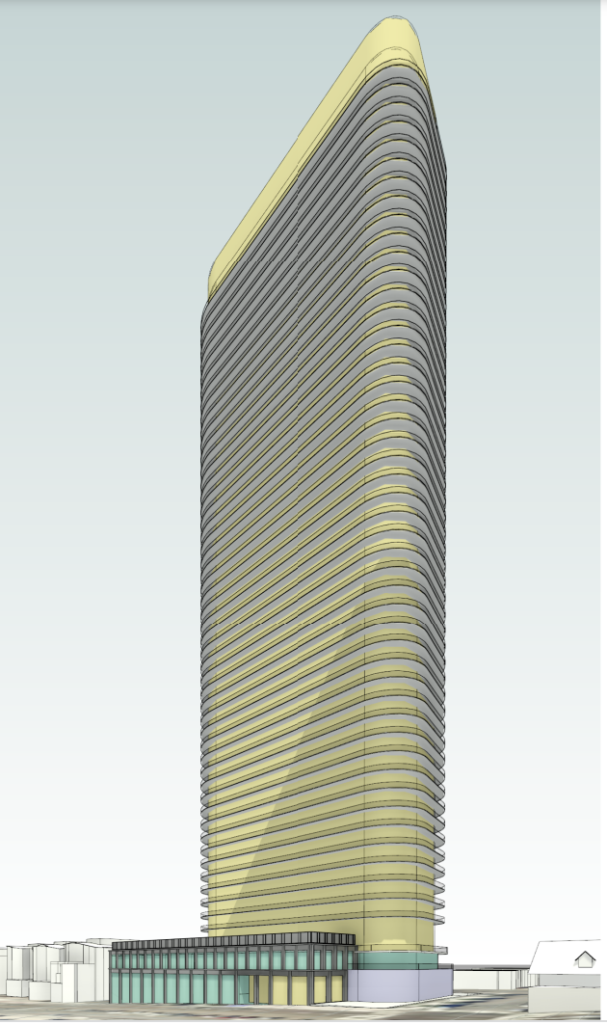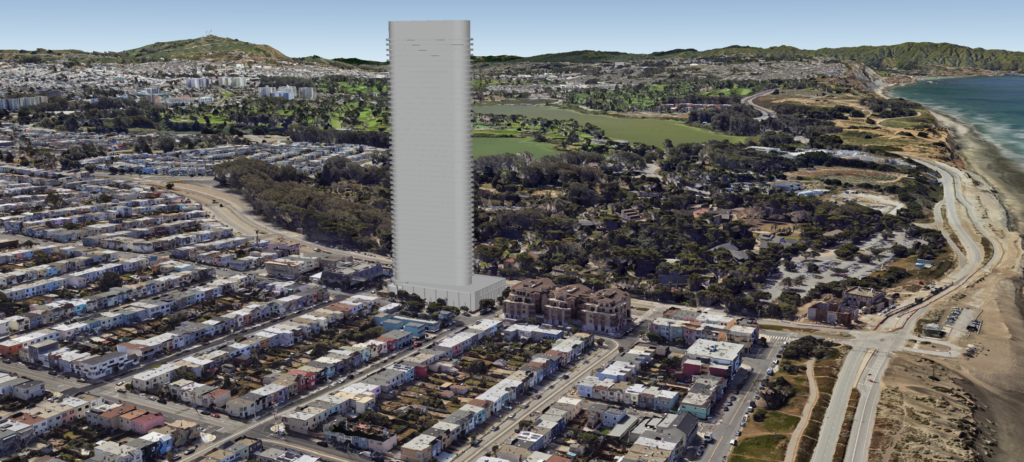Up to now, when it comes to development, Scott Wiener and the Yimbys have always agreed that bigger is better. So it’s notable that they’re at odds about the 50-story skyscraper being proposed for 2700 Sloat Boulevard.
The Yimbys love it. “It’s so beautiful,” tweeted California Yimby CEO Brian Hanlon over a rendering of the tower. “We think the project is very exciting,” Yimby Law Director Sonja Trauss told the Chronicle. “More housing is more housing. And what better place to build it than by the beach?”
The project site, currently occupied by the Sloat Garden Center, is three blocks from the ocean and at the edge of a neighborhood dominated by single-family homes.
Neighbors of 2700 Sloat fought an earlier, 12-story iteration of the project. Now they’ve launched a protest against the 50-story version.
City officials say that the city’s planning code and state law do not authorize the project as currently configured.

The Yimbys say they do. “What allows them to build this tower,” opined Trauss in an article posted by SF Yimby, “is the State Density Program. Their plan is to waive the height limit.”
Wiener is opposed. In an ABC7 story, the senator called the project “a distraction from the housing work that we’re doing,” adding: “I don’t think they’re relying on any housing law that I’ve authored as a legislator. I think they are relying on the state density bonus law which has been around for 40 years.”
In fact, the project is the logical culmination of Wiener’s and his colleagues’ work.

The developer, Nevada-based CH Planning, may not be relying on any housing law that the senator authored. But as Wiener and the Yimbys say, CH Planning is relying on a 2020 law that the senator supported when it was AB 2345. Authored by Lorena Gonzalez (D), AB 2345 amended the state density bonus law to allow a density increase of up to 50 percent for projects that dedicate 15 percent of their units to lower-income households.
Lower-income households are officially considered households who earn 80 percent of the Area Median Income. In 2022, 80 percent of the San Francisco AMI for a household of four people was $110,850.
The project proposed for 2700 Sloat would have 712 residences, of which 115 would be designated as affordable for households earning 80 percent of the local AMI.
As AB 2345 moved through the Legislature, Wiener voted for it three times, as did almost every other member of the Legislature. The bill was endorsed by California Yimby. It was signed into law by Gavin Newsom in August 2020.
Moreover, a current bill co-authored by Wiener and Assemblymember Buffy Wicks (D), SB 423, capitalizes on the state density bonus law. SB 423 amplifies Wiener’s SB 35. Among other things, such as sidelining elected officials in the project approval process, SB 423 extends SB 35’s draconian provisions to the state’s coastal zone. The project at 2700 Sloat is just inside the San Francisco Coastal Zone.
Wiener’s and the Yimbys’ disagreement over 2700 Sloat reflects fundamental differences of political character and ambition. The Yimbys are true believers who practice a take-no-prisoners politics. Wiener once called them “our shock troops.” By contrast, the senator is a politician who’s running for Congress.
The political peril represented by 2700 Sloat was sketched in an April 14 Twitter thread by one of the most prominent academic enablers of the build, baby, build movement, UC Davis Professor of Law Chris Elmendorf. “[F]rom what I see,” Elmendorf wrote,
the developer has a plausible argument that they’re entitled to the waivers, and San Francisco may not want to push back too hard[,] as it’s facing pretty intense scrutiny from the state.
OTOH, if the city approves a 50-story tower in a low-rise neighborhood “b/c Density Bonus Law made us do it,’” the politics of the housing element could become even trickier.
Opponents will complain: “You say our street is being rezoned for 5-8 story buildings, but…with density bonuses, it could be 20, 30, even 50!”
And they’ll have a point.
In other words, the push for mega-density is dangerously out of touch with voter sentiment. That disconnect helps explain why Wiener is distancing himself from 2700 Sloat and disavowing his aggressive pro-growth legislative record.
Will other ambitious California politicians follow suit?





